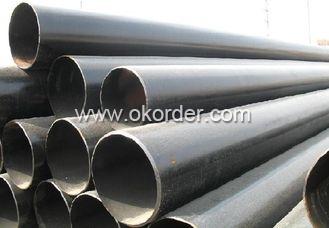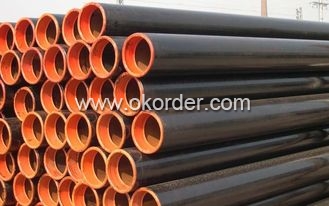Seamless Steel Tube And Pipe For Gas Cylinder
- Loading Port:
- China Main Port
- Payment Terms:
- TT or LC
- Min Order Qty:
- 20mt m.t.
- Supply Capability:
- 5000 Tons Per Month m.t./month
OKorder Service Pledge
Quality Product, Order Online Tracking, Timely Delivery
OKorder Financial Service
Credit Rating, Credit Services, Credit Purchasing
You Might Also Like
Specifications of Seamless Steel Tube And Pipe For Gas Cylinder
Wide Range of Size: from 60mm to 559mm
Flexible MOQ: 4 ton/per size
Product: Seamless Steel Pipe for Gas Cylinder
1. Size Range:

2. Chemical Copmosition(%):

3. Mechanical Properties:

4. Tolerances on Demisions:

Packaging/Delivery of Seamless Steel Tube And Pipe For Gas Cylinder
Wrapped in bundles with steel strips or according to customers' requirements


- Q:Can steel pipes be used for underground transportation tunnels?
- Underground transportation tunnels can indeed utilize steel pipes. For a multitude of purposes like water, gas, and sewage transportation, steel pipes are commonly employed in the construction of these tunnels. Renowned for their resilience, durability, and ability to resist corrosion, steel pipes are remarkably suitable for underground applications. With the capacity to endure the weight and pressure exerted by the nearby soil, they can also be reinforced to guarantee stability. Moreover, steel pipes offer flexibility in tunnel design as they can be manufactured in various sizes and lengths. Nonetheless, one must carefully consider factors such as soil conditions, load-bearing capacity, and potential environmental impacts before opting for steel pipes in underground transportation tunnels.
- Q:Can steel pipes be used for geothermal systems?
- Yes, steel pipes can be used for geothermal systems. Steel pipes are commonly used in geothermal systems due to their durability, high strength, and resistance to corrosion. They can effectively handle the high temperatures and pressures associated with geothermal operations, making them a reliable choice for transporting geothermal fluids. Additionally, steel pipes are readily available and cost-effective, making them a practical option for geothermal system installations.
- Q:How does the price of steel pipes vary based on market demand?
- The price of steel pipes varies based on market demand because when the demand for steel pipes is high, the prices tend to increase as suppliers can charge more for their products. Conversely, when the demand is low, the prices may decrease as suppliers may need to offer discounts or special deals to attract buyers. Essentially, the price of steel pipes fluctuates with changes in market demand.
- Q:How are steel pipes used in the construction of desalination plants?
- Steel pipes are commonly used in the construction of desalination plants for various purposes. They are primarily utilized for the transportation of seawater and brine, as well as for the distribution of fresh water throughout the plant. Steel pipes are preferred due to their durability, corrosion resistance, and ability to withstand high pressure and extreme temperatures. Additionally, they can be easily welded together, allowing for efficient installation and maintenance.
- Q:What is the tensile strength of steel pipes?
- The tensile strength of steel pipes can vary depending on the grade and type of steel used. However, in general, steel pipes have a high tensile strength. Typically, carbon steel pipes have a tensile strength range of 370 to 700 megapascals (MPa), while alloy steel pipes can have a tensile strength range of 770 to 1200 MPa. These high tensile strengths allow steel pipes to withstand high levels of pressure and stress, making them suitable for a wide range of applications such as in the construction, oil and gas, and automotive industries. It is important to note that the tensile strength of steel pipes can also be influenced by other factors such as the manufacturing process, heat treatment, and the presence of any defects or imperfections. Therefore, it is advisable to consult the specifications provided by the manufacturer or industry standards to determine the exact tensile strength of a specific steel pipe.
- Q:Can steel pipes be used for wastewater treatment systems?
- Yes, steel pipes can be used for wastewater treatment systems. Steel pipes are commonly used in wastewater treatment systems due to their durability, corrosion resistance, and ability to handle high pressure and flow rates. Moreover, steel pipes can be easily welded, making them suitable for various configurations and applications within the wastewater treatment process.
- Q:How are steel pipes coated for protection against external elements?
- Steel pipes are coated for protection against external elements through various methods, such as hot-dip galvanizing, epoxy coating, or fusion-bonded epoxy coating. These coatings provide a barrier between the steel and the environment, preventing corrosion and extending the lifespan of the pipes.
- Q:What is the difference between steel pipes and plastic pipes?
- The main difference between steel pipes and plastic pipes lies in their material composition. Steel pipes are made from a durable and strong metal alloy, while plastic pipes are composed of various types of plastic polymers. This difference in materials leads to variations in their properties and usage. Steel pipes are known for their high strength, resistance to extreme temperatures and pressures, and longevity, making them suitable for applications requiring robustness, such as in industrial settings or underground pipelines. On the other hand, plastic pipes are lightweight, flexible, and corrosion-resistant, making them ideal for plumbing, irrigation, and other non-industrial applications. Additionally, plastic pipes are easier to install and handle due to their lighter weight and flexibility compared to steel pipes.
- Q:How are steel pipes sized and classified?
- Steel pipes are sized and classified primarily based on their outer diameter (OD) and wall thickness. The sizing of steel pipes is standardized to ensure compatibility and ease of use in various applications. The most common method of sizing steel pipes is by nominal pipe size (NPS), which is a North American standard that refers to a pipe's OD. NPS sizes range from 1/8 inch to 36 inches, with each size corresponding to a specific OD. For example, a 1/2-inch NPS pipe has an OD of 0.84 inches, while a 12-inch NPS pipe has an OD of 12.75 inches. It is important to note that the OD of a pipe may not necessarily match its actual measurement, as it is based on historical pipe dimensions. Additionally, steel pipes are classified into different schedules, which indicate the wall thickness of the pipe. The most common schedules are SCH 5, SCH 10, SCH 40, SCH 80, and SCH 160, with higher numbers representing thicker walls. These schedules are standardized and help in selecting the appropriate pipe for a given application. Furthermore, steel pipes may be further classified based on their end connections. The most common types include threaded, plain-end, and socket-weld connections. Threaded pipes have screw threads on both ends, allowing for easy assembly and disassembly. Plain-end pipes have no threads and are usually joined using welding techniques. Socket-weld pipes have a socket-like end that allows for welding with a corresponding fitting. In summary, steel pipes are sized and classified based on their outer diameter, wall thickness, and end connections. The nominal pipe size (NPS) indicates the outer diameter, while the schedule number represents the wall thickness. Understanding the sizing and classification of steel pipes is crucial in selecting the appropriate pipe for specific applications in industries such as construction, oil and gas, plumbing, and manufacturing.
- Q:How are steel pipes used in the telecommunications network infrastructure?
- Steel pipes are commonly used in the telecommunications network infrastructure as a means of protecting and housing underground cables. These pipes provide a durable and secure pathway for the cables, safeguarding them from environmental factors such as moisture, extreme temperatures, and physical damage. Additionally, steel pipes offer excellent strength and rigidity, allowing for the installation of multiple cables within a single pipe, thereby reducing costs and simplifying maintenance.
After more than a decade’s construction and development, we have taken a leading position in seamless steel tube industry in China. In the year 2007, it awarded Famous-brand product Certificate. Besides, we have been named as excellent supplier of Qualified Products by our customers for several times.
1. Manufacturer Overview |
|
|---|---|
| Location | Wuxi, China |
| Year Established | 1991 |
| Annual Output Value | 300,000Tons |
| Main Markets | Europe; Southeast Asia; etc. |
| Company Certifications | API 5L;API 5CT;API Q1;ISO/TS29001 |
2. Manufacturer Certificates |
|
|---|---|
| a) Certification Name | |
| Range | |
| Reference | |
| Validity Period | |
3. Manufacturer Capability |
|
|---|---|
| a)Trade Capacity | |
| Nearest Port | Wuxi; Shanghai |
| Export Percentage | 41% - 50% |
| No.of Employees in Trade Department | 3900-4000 People |
| Language Spoken: | English; Chinese; Spanish |
| b)Factory Information | |
| Factory Size: | Above 450,000 square meters |
| No. of Production Lines | Above 10 |
| Contract Manufacturing | OEM Service Offered;Design Service Offered |
| Product Price Range | Average |
Send your message to us
Seamless Steel Tube And Pipe For Gas Cylinder
- Loading Port:
- China Main Port
- Payment Terms:
- TT or LC
- Min Order Qty:
- 20mt m.t.
- Supply Capability:
- 5000 Tons Per Month m.t./month
OKorder Service Pledge
Quality Product, Order Online Tracking, Timely Delivery
OKorder Financial Service
Credit Rating, Credit Services, Credit Purchasing
Similar products
New products
Hot products
Related keywords































